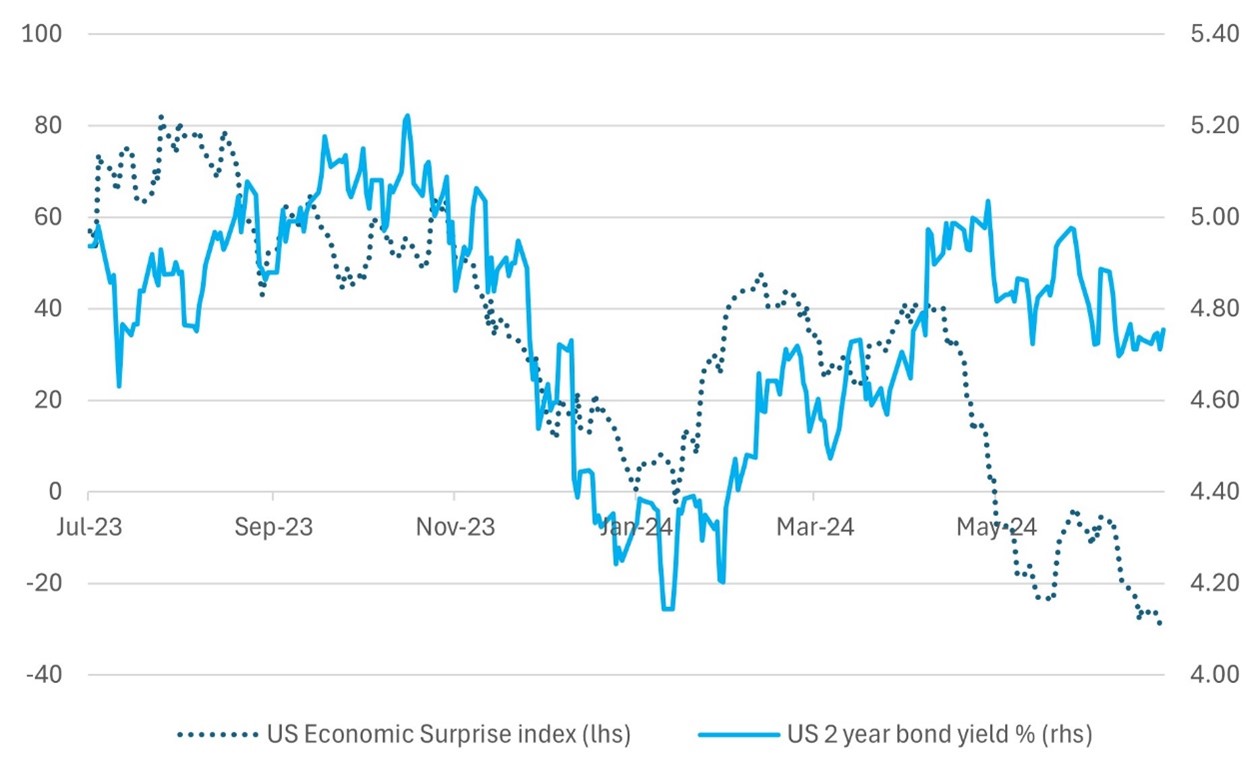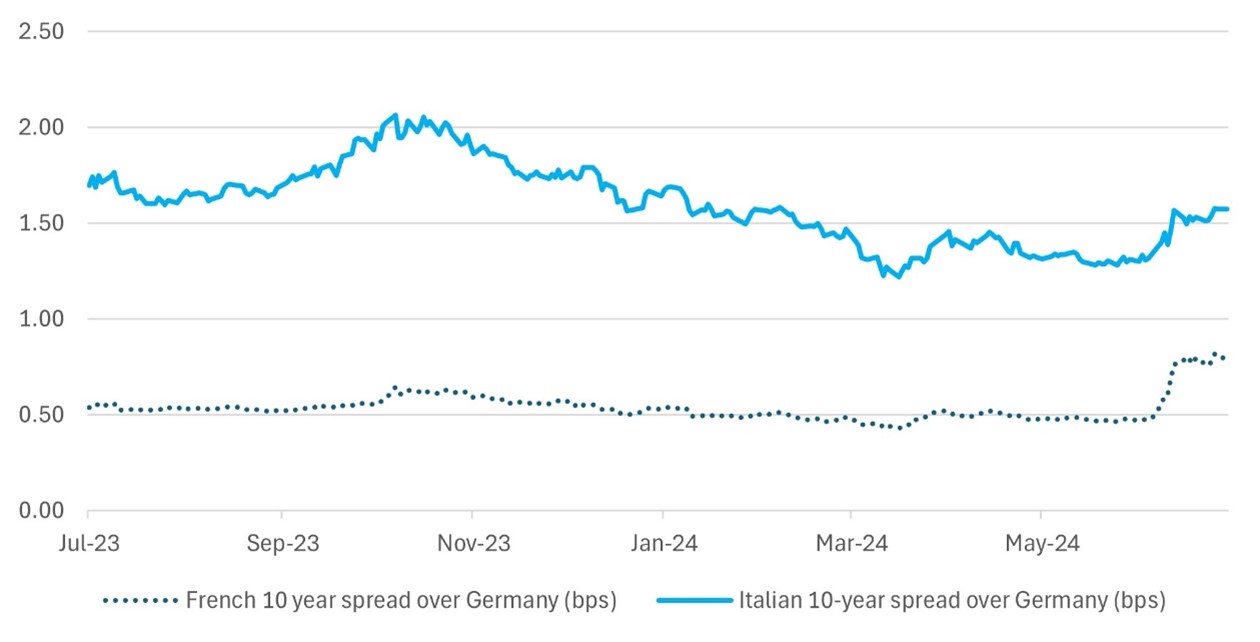By Falco
01 Jul 2024
• US politics in state of flux and still five months to go
• US equity market doesn’t agree with the Fed's view, but the bond market does agree
• French politics in a state of flux
• The ECB may be called to sooth the nerves of investors in the French bond market
• Considerable change likely in UK election
Last week, I was in California observing the machinations of US politics during and in the aftermath of the Presidential debate. Two observations: people were stunned by just how poorly President Biden performed. Democrat party activists were receiving panic phone messages minutes into the debate. The pressure for Joe Biden to step down is enormous. However, he is a very stubborn character, and only he can make the call. One of the challenges for the Democratic party is that there is no obvious candidate to step forward that would have universal support.
The Equity Market starts to Ignore the Fed, but not the Bond Market
The financial markets ended the quarter on a soft note. As we have noted in these columns recently, concerns have been mounting that the Fed’s view on future monetary policy is not in sync with the current economic data. The Fed’s last ‘dot plot’ from just a few weeks ago abandoned its own previous view of three rate cuts and instead signalled that there will be just one this year. This has come amidst weakening US economic data and inflation that has been better behaved.
As the US equity market absorbed some disappointing news last week, investors would like to feel a bit more confident that the Fed’s policy would adapt quickly to any weakness in economic data. However, as US economic data has weakened, speeches by the Fed governors still signal a cautious approach to relaxing monetary policy.
The closing mood of the U.S. equity market on Friday was interesting because, in a very mixed end to the quarter, we saw some positive performance from interest rate-sensitive sectors such as real estate (+0.6%) and financials (+0.4%). The market is prepared to bet that the Fed will come around the market's way of thinking that a rate cut is more imminent than the Fed has signalled to date.
In the bond market there does appear to be an inconsistency between the level of the two-year bond yield and the degree to which US economic data has softened. The US economic surprise index has weakened sharply since March (Chart 1). The index, which shows the degree to which US economic data is either above or below expectations, has slipped to an index level of -28 from 40 and yet the two-year government bond yield has risen, remaining around the 4.75% level.
Chart 1: US Economy Softens but Interest Rates yet to Follow Suit

Source: Bloomberg
French Polls
Meanwhile, across the Atlantic, as France headed to the polls, financial markets are closely watching, particularly wary of the growing clout of parties with extreme views on both the right (National Rally) and the left (New Popular Front). The results were not remarkable relative to expectations. However, France is waking up this morning to the reality of the prospect of a more extreme political movement than seen in decades potentially setting domestic policy.
Currently, neither the right-wing nor the left-wing parties appear poised to secure a majority on their own. If that happens, President Macron’s party, which incidentally looks likely to be relegated to the third place in polling, may need to broker a coalition between these opposing factions. The National Rally party will probably not win an absolute majority however they do have an outside chance. The more likely scenario of no party having overall control will lead to an unstable phase for French politics with President Macron trying to bring sides together to form a new government.
France, though, should not be seen in isolation. High inflation, high debt, disaffection among youth, and concerns about migration prevail around the world. As we are seeing in France and the UK, the establishment is at risk of being wiped out in polls. The Conservative Party in the UK looks set to lose a significant percentage of its seats at the next election.
The hope will be that any new French government coalition will find that the weight of governing a large economy will temper their radical policies. Indeed, as we saw in the UK with Liz Truss as prime minister, if the radical policy ideas are not liked by the market, the reaction alone can undermine an administration.
Potential Response of the ECB to French elections
The rise of extreme parties in a major EU member state like France could introduce significant uncertainty into the Eurozone. The European Central Bank (ECB) therefore will be closely monitoring these developments. The central bank might respond with caution, ensuring that its monetary policy remains supportive to counter any potential market volatility. Additionally, the central bank may emphasize the importance of fiscal responsibility and stability, urging any new French government to adhere to EU fiscal rules. The ECB's primary focus would likely be on maintaining economic stability across the bloc, potentially adjusting its policies to mitigate any adverse effects from political instability in France.
Nevertheless, market attention has turned to whether the ECB will see it fit to intervene in the market. The central bank launched its Transmission Protection Instrument (TPI) two years ago, giving itself the power to help a country in crisis by buying unlimited amounts of its debt. However, the ECB will be in a dilemma if the volatility in the French bond market is created by profoundly wrong domestic French policies of any new government rather than what the ECB would consider “unwarranted, disorderly market dynamics”. The central bank has set out specific criteria that have to be met in order for it to activate a TPI programme. One of those is that the target country must be in compliance with the EU fiscal framework – which France is not. The country is running a budget deficit that is 5.5% of GDP against the 3.0% limit.
Chart 2: French Bond Spread over German Bunds Still Well Below That of Italy

Source: Bloomberg
Gary Dugan - Investment Committee Member
Bill O'Neill - Non-Executive Director & Investor Committee Chairman
1st July 2024
The information contained within is for educational and informational purposes ONLY. It is not intended nor should it be considered an invitation or inducement to buy or sell a security or securities noted within nor should it be viewed as a communication intended to persuade or incite you to buy or sell security or securities noted within. Any commentary provided is the opinion of the author and should not be considered a personalised recommendation. The information contained within should not be a person's sole basis for making an investment decision. Please contact your financial professional at Falco Private Wealth before making an investment decision. Falco Private Wealth are Authorised and Regulated by the Financial Conduct Authority. Registered in England: 11073543 at Millhouse, 32-38 East Street, Rochford, Essex SS4 1DB
